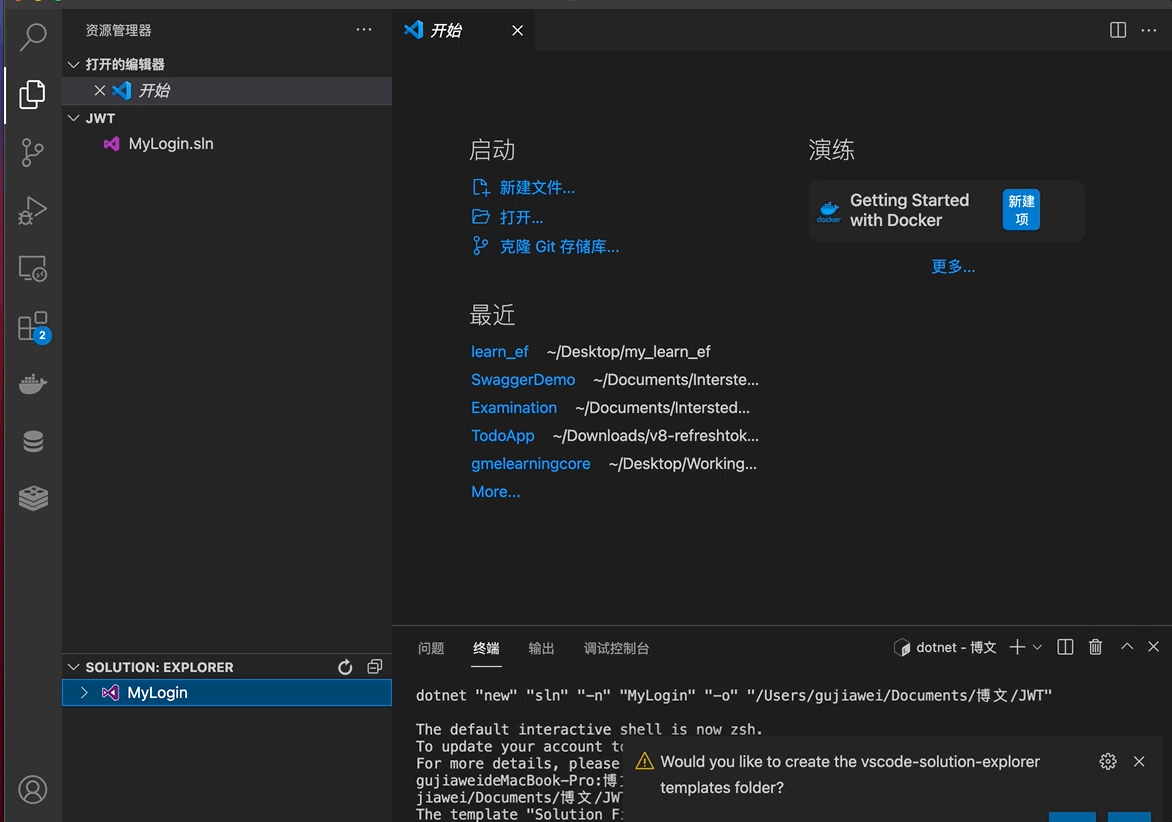.Net圈儿的朋友们,大家好!我可太喜欢如今开源的.Net了,写代码很巴适!所以今天分享一下之前学习的一个登录小案例,代码有不足之处欢迎指正!!!
工具:采用VSCode及其插件开发,轻量化的同时减少命令行的敲写
关于开源插件的使用也是在QQ群 346250023 群主分享学来,可进群交流使用!


一、通过插件创建WebApi项目

二、利用插件下载项目所需要的Nuget包

三、代码编写
①新建User实体
/// <summary>
/// 登录用户实体类 继承Identiy框架提供的 IdentityUser类
/// </summary>
public class AppUser:IdentityUser
{
// 自己再扩充三个字段
public DateTime DateCreated { get; set; }
public DateTime DateModified { get; set; }
public string FullName { get; set; }
}②新建一个上下文类
public class AppDBContext : IdentityDbContext<AppUser, IdentityRole, string>
{
public AppDBContext(DbContextOptions options) : base(options)
{
}
}③在Startup依赖注入上下文类
services.AddDbContext<AppDBContext>(options =>
{
options.UseMySql(Configuration.GetConnectionString("DefaultConnection"), MySqlServerVersion.LatestSupportedServerVersion);
});
// AddEntityFrameworkStores 用来创建 用户和密码之间的服务
services.AddIdentity<AppUser, IdentityRole>(opt => { }).AddEntityFrameworkStores<AppDBContext>();④在终端codefirst生成数据表
dotnet ef migrations add init
dotnet ef database update
⑤配置JWT
ConfigureServices方法里面配置服务
services.AddAuthentication(x =>
{
x.DefaultAuthenticateScheme = JwtBearerDefaults.AuthenticationScheme;
x.DefaultChallengeScheme = JwtBearerDefaults.AuthenticationScheme;
})
.AddJwtBearer(options =>
{
// jwt的 key 需要设置复杂点
var key = Encoding.ASCII.GetBytes(Configuration["JWTConfig:Key"]);
var issure = Configuration["JWTConfig:Issuer"]; // 发行人
var audience = Configuration["JWTConfig:Audience"]; // 受众
options.TokenValidationParameters = new TokenValidationParameters()
{
ValidateIssuerSigningKey = true,
IssuerSigningKey = new SymmetricSecurityKey(key),
ValidateIssuer = true, // 设置为True时 ValidIssure 属性设置下 不然jwt验证不会通过
ValidateAudience = true, // 同上 ValidAudience 属性设置下
RequireExpirationTime = true,
ValidateLifetime=true, // token失效缓冲时间 默认是五分钟 失效时间需要加上这五分钟缓冲
// 如果 上面 ValidateIssuer 配置为false 则不需要下面两个属性
ValidIssuer = issure,
ValidAudience = audience,
};
});
// 多角色时 可以这样配置 [Authorize(Policy ="PolicyGroup")] 动作方法上可以简写
services.AddAuthorization(options =>
{
options.AddPolicy("PolicyGroup", policy => policy.RequireRole("Admin", "User"));
});Configure 方法里面使用服务
public void Configure(IApplicationBuilder app, IWebHostEnvironment env)
{
if (env.IsDevelopment())
{
app.UseDeveloperExceptionPage();
app.UseSwagger();
app.UseSwaggerUI(c => c.SwaggerEndpoint("/swagger/v1/swagger.json", "SwaggerDemo v1"));
}
app.UseHttpsRedirection();
app.UseCors("any");
app.UseRouting();
// 注意顺序
app.UseAuthentication();
app.UseAuthorization();
app.UseEndpoints(endpoints =>
{
endpoints.MapControllers();
});
}⑥swagger配置
ConfigureServices方法里面配置服务
services.AddSwaggerGen(c =>
{
c.SwaggerDoc("v1", new OpenApiInfo { Title = "SwaggerDemo", Version = "v1", Description = "Demo API for showing Swagger" });
// 下面两步配置 实现 swagger 上面 “锁”
c.AddSecurityDefinition("Bearer", new OpenApiSecurityScheme
{
In = ParameterLocation.Header, // 位于Header
Description = "请于此处直接填写token 无需 Bearer然后再加空格的形式",
Name = "Authorization",
Type = SecuritySchemeType.Http,
BearerFormat = "JWT",
Scheme = "bearer"
});
c.AddSecurityRequirement(new OpenApiSecurityRequirement{
{
new OpenApiSecurityScheme{
Reference=new OpenApiReference{
Type=ReferenceType.SecurityScheme,
Id="Bearer"
}
},Array.Empty<string>()
}
});
// swagger接口注释显示
// 注意 vscode 用户需要在项目的csproj文件里面手动配置生成注释文档的属性
// 具体参见项目文件里的PropertyGroup
var fileName = $"{Assembly.GetExecutingAssembly().GetName().Name}.xml";
var filePath = Path.Combine(AppContext.BaseDirectory, fileName);
c.IncludeXmlComments(filePath);
});Configure 方法里面使用服务
public void Configure(IApplicationBuilder app, IWebHostEnvironment env)
{
if (env.IsDevelopment())
{
app.UseDeveloperExceptionPage();
// swagger 中间件使用
app.UseSwagger();
// 此处的 v1 必须与上面c.SwaggerDoc("v1") 里的一致
app.UseSwaggerUI(c => c.SwaggerEndpoint("/swagger/v1/swagger.json", "SwaggerDemo v1"));
}
app.UseHttpsRedirection();
app.UseCors("any");
app.UseRouting();
// 注意顺序
app.UseAuthentication();
app.UseAuthorization();
app.UseEndpoints(endpoints =>
{
endpoints.MapControllers();
});
}⑦创建UserController,并通过构造函数注入登录服务
private readonly UserManager<AppUser> _userManger; // 用户服务
private readonly SignInManager<AppUser> _signInManger; // 登录服务
private readonly RoleManager<IdentityRole> _roleManger; // 角色服务
private readonly JWTConfig _jwtConfig; // 配置框架将配置文件注入实体类
public UserController(ILogger<UserController> logger, UserManager<AppUser> userManager,
SignInManager<AppUser> signInManager, IOptions<JWTConfig> jwtConfig, RoleManager<IdentityRole> roleManger)
{
this._logger = logger;
this._userManger = userManager;
this._signInManger = signInManager;
this._jwtConfig = jwtConfig.Value;
this._roleManger = roleManger;
}*注册用户
/// <summary>
/// 用户注册
/// AddAndUpdateUserrRegisterModel 是一个Dto 接受对象
/// AllowAnonymous 不需要权限验证
/// 作者 xxxx
/// </summary>
/// <param name="model"></param>
/// <returns></returns>
[AllowAnonymous]
[HttpPost("RegisterUser")]
public async Task<Object> RegisterUser(AddAndUpdateUserrRegisterModel model)
{
try
{
// check 注册的时候是否包含角色
if (model.Roles is null || model.Roles.Count <= 0)
{
return await Task.FromResult(new ResponseModel(Enums.ResponseCode.Error, "角色不能为空"));
}
// 循环判断用户所注册的角色时候存在 创建角色的方法 AddRole()
foreach (var item in model.Roles)
{
if (!await _roleManger.RoleExistsAsync(item))
{
return await Task.FromResult(new ResponseModel(Enums.ResponseCode.Error, "不存在创建的角色"));
}
}
// 生成一个用户类
var user = new AppUser()
{
UserName = model.Email,
FullName = model.FullName,
Email = model.Email,
DateCreated = DateTime.Now,
DateModified = DateTime.UtcNow
};
// 注册用户
var result = await _userManger.CreateAsync(user, model.Password);
if (result.Succeeded)
{
// 注册成功后 获取临时刚刚创建的用户
var tempUser = await _userManger.FindByEmailAsync(model.Email);
// 循环给创建的用户添加角色
foreach (var role in model.Roles)
{
await _userManger.AddToRoleAsync(tempUser, role); // 添加角色
}
return await Task.FromResult(new ResponseModel(Enums.ResponseCode.Ok, "用户被成功注册!", null));
}
// 创建用户失败返回
return await Task.FromResult(string.Join(",", result.Errors.Select(x => x.Description).ToArray()));
}
catch (System.Exception ex)
{
// 异常返回
return await Task.FromResult(new ResponseModel(Enums.ResponseCode.Error, ex.Message, null));
}
}
*登录
/// <summary>
/// 生成Token
/// 作者 xxxx
/// </summary>
/// <param name="user"></param>
/// <returns></returns>
private string GenarateToken(AppUser user, List<string> roles)
{
var jwtTokenHandle = new JwtSecurityTokenHandler();
var key = Encoding.ASCII.GetBytes(_jwtConfig.Key);
// 配置 Subject
var claims = new List<Claim>()
{
new Claim(JwtRegisteredClaimNames.NameId,user.Id),
new Claim(JwtRegisteredClaimNames.Email,user.Email),
new Claim(JwtRegisteredClaimNames.Jti,Guid.NewGuid().ToString())
};
foreach (var role in roles)
{
claims.Add(new Claim(ClaimTypes.Role,role));
}
var tokenDescriptor = new SecurityTokenDescriptor
{
// 多重角色
Subject=new ClaimsIdentity(claims),
// 单一角色
// Subject = new ClaimsIdentity(new[]
// {
// new System.Security.Claims.Claim(JwtRegisteredClaimNames.NameId,user.Id),
// new System.Security.Claims.Claim(JwtRegisteredClaimNames.Email,user.Email),
// new System.Security.Claims.Claim(JwtRegisteredClaimNames.Jti,Guid.NewGuid().ToString())
// // new System.Security.Claims.Claim(ClaimTypes.Role,"role")
// }),
// 过期时间 12小时
Expires = DateTime.UtcNow.AddSeconds(6),
SigningCredentials = new SigningCredentials(new SymmetricSecurityKey(key), SecurityAlgorithms.HmacSha256Signature),
Audience = _jwtConfig.Audience, // 这里不配置 也会返回UnAuthorized
Issuer = _jwtConfig.Issuer // 同上
};
// 创建token
var token = jwtTokenHandle.CreateToken(tokenDescriptor);
return jwtTokenHandle.WriteToken(token);
} /// <summary>
/// 用户登录
/// LoginModel 登录Dto接收
/// 作者 xxxx
/// </summary>
/// <param name="model"></param>
/// <returns></returns>
[AllowAnonymous]
[HttpPost]
public async Task<object> Login(LoginModel model)
{
try
{
if (!ModelState.IsValid)
{
return await Task.FromResult(new ResponseModel(Enums.ResponseCode.Error, "参数不合法!", null));
}
var result = await _signInManger.PasswordSignInAsync(model.UserName, model.Password, false, false);
if (result.Succeeded)
{
// 成功的话获取用户
var appUser = await _userManger.FindByNameAsync(model.UserName);
var roles = (await _userManger.GetRolesAsync(appUser)).ToList();
// await _userManger.GetRolesAsync(appUser);
var user = new UserDto(appUser.FullName, appUser.Email, appUser.UserName, appUser.DateCreated, roles)
{
// 生成Token
Token = GenarateToken(appUser,roles)
};
return await Task.FromResult(new ResponseModel(Enums.ResponseCode.Ok, "登录成功", user));
}
else
{
return await Task.FromResult(new ResponseModel(Enums.ResponseCode.Error, "登录失败", null));
}
}
catch (System.Exception ex)
{
return await Task.FromResult(new ResponseModel(Enums.ResponseCode.Error, ex.Message, null));
}
}

*添加角色

先将上文用户登录产生的token 设置到swagger里面,然后访问只有 Admin 角色可以访问的接口
/// <summary>
/// 添加角色
/// [Authorize(Roles ="Admin")] 只有Admin角色的用户可以访问
/// 作者 xxx
/// </summary>
/// <param name="model"></param>
/// <returns></returns>
[Authorize(Roles ="Admin")]
[HttpPost("AddRole")]
public async Task<object> AddRole(AddRoleModel model)
{
try
{
if (model is null || string.IsNullOrWhiteSpace(model.Role))
{
return await Task.FromResult(new ResponseModel(Enums.ResponseCode.Error, "角色不能为空"));
}
// 判断【AspNetRoles】 表里 角色是否存在
if (await _roleManger.RoleExistsAsync(model.Role))
{
return await Task.FromResult(new ResponseModel(Enums.ResponseCode.Ok, "角色存在了"));
}
var role = new IdentityRole()
{
Name = model.Role,
};
// 创建角色
var result = await _roleManger.CreateAsync(role);
if (result.Succeeded)
{
return await Task.FromResult(new ResponseModel(Enums.ResponseCode.Ok, "角色创建成功!"));
}
else
{
return await Task.FromResult(new ResponseModel(Enums.ResponseCode.Error, "角色创建失败!"));
}
}
catch (System.Exception)
{
return await Task.FromResult(new ResponseModel(Enums.ResponseCode.Error));
}
}关于我们token权限在校验时出现失败怎么办? 这里Asp.Net Core 5.0 新增一个接口【IAuthorizationMiddlewareResultHandler】可以处理权限验证 看下文代码展示!
/// <summary>
/// 这个是Asp.Net Core 5 新增的授权处理失败 可以直接暴露出请求上下文 省事很多啦!!!
/// 作者 xxx
/// </summary>
public class AuthorizationHandleMiddleWare : IAuthorizationMiddlewareResultHandler
{
private readonly AuthorizationMiddlewareResultHandler authorizationHandleMiddleWare =new();
public async Task HandleAsync(RequestDelegate next, HttpContext context, AuthorizationPolicy policy, PolicyAuthorizationResult authorizeResult)
{
// 当 token失效或者token不存在的时候 authorizeResult.Challenged 为True
if(authorizeResult.Challenged)
{
// todo 拿到上下文user对象后 此处可以check token 区分token是否是过期了
var a=context.Request.Headers["Authorization"];
context.Response.StatusCode=(int)HttpStatusCode.OK;
await context.Response.WriteAsJsonAsync(new ResponseModel(Enums.ResponseCode.UnAuthorized,"您未授权,请检查Token是否有效!"));
return ;
}
// 此时token 校验通过 但是访问的资源的没权限的话 authorizeResult.Forbidden 为true
if(authorizeResult.Forbidden)
{
context.Response.StatusCode=(int)HttpStatusCode.OK;
await context.Response.WriteAsJsonAsync(new ResponseModel(Enums.ResponseCode.ForBidden,"您无此权限访问哦!"));
return ;
}
await authorizationHandleMiddleWare.HandleAsync(next,context,policy,authorizeResult);
}
}另外还需要在ConfigureService里面注册下服务
// .net 5 新增的权限验证中间件 在此处依赖注入一下 详见 AuthorizationHandleMiddleWare.cs 文件
services.AddSingleton<IAuthorizationMiddlewareResultHandler,AuthorizationHandleMiddleWare>();以上就是一个登录的简单demo,详细代码请访问码云
喝水不忘挖井人,推荐个大佬!









 https://gitee.com/holyace/together/tree/JarryGu_develop/framework/JwtLoginDemo
https://gitee.com/holyace/together/tree/JarryGu_develop/framework/JwtLoginDemo













 1349
1349

 被折叠的 条评论
为什么被折叠?
被折叠的 条评论
为什么被折叠?








